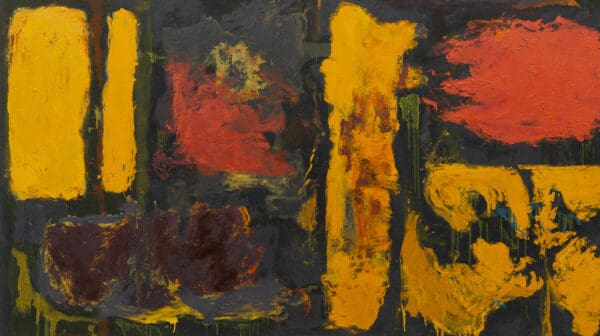
Making Space at the Table
NAP Contemporary’s group show, The Elephant Table, platforms six artists and voices—creating chaos, connection and conversation.
The arts industry is full of gatekeepers: from curators, critics, academic institutions, funding bodies and art prizes, to museums and galleries. Gatekeepers in these settings are usually a small group of people with power, access and established networks, who make decisions to determine what art, artforms, or artists are given resources or visibility. There is another form of gatekeeping that I have seen and experienced, which I call ‘personal gatekeeping’. This type of gatekeeping is often muddled with ‘imposter syndrome’ (the belief that you are inadequate or incompetent), because it influences your own valuation of yourself in relation to your work.
For this piece I wanted to speak with artists who had stopped making work in recent years to ask whether they still considered themselves artists. I called this question one of ‘personal gatekeeping’ as the title of ‘artist’ is a self-determined identity and isn’t justified through profit, or academic and vocational titles alone. I was interested in seeing whether the question could encapsulate broader feelings of expectations and productivity—how long can an artist not make art and still be an artist? Who decides?
For Melbourne-based artist Janelle Low, who also works as a lecturer and art documenter, the pandemic offered her a “rare opportunity to slow down and reassess” her artistic practice and the direction she wanted to pursue. Low recognises this is a privileged position as she does not rely on her artistic practice to pay the bills. It is a deliberate choice for her to “have art on the side”, where there is a focus on quality, rather than quantity.
This reassessment was shared by Canberra-based Anja Loughhead, who considers herself a “failed artist” who nowadays resolves artistic questions through curating, writing and research instead. For Loughhead this came down to the long-term unsustainability of funding her own art career when that art work wasn’t commercially viable or receiving alternate sources of financial support through residencies and grants. “I was tired of spending my income on making my art,” she told me.
At the heart of many of my conversations is the reality that reduced opportunities during the pandemic has created an untenable and more fraught landscape. Nina Ross, whose practice is also accompanied by extensive collaborative projects, shares that she was tired of the exhibition-making process, and that the pandemic showed her that “art is not sustainable”. Ross and I, who share a common affinity for rescue greyhounds as well as artist unionisation, spoke at length about whether making art in a neoliberal and capitalistic world can ever be free from these pressures.
Central to this is a lack of recognition for artists if there is no visible ‘outcome’ to assess their artistic merit. As Debbie Pryor, an Adelaide-based artist, writer and curator, shares with me, “Creating and problem solving in your mind is as big a part of an arts practice as exhibiting and selling work.” Yet our society only recognises the latter as ‘art’.
Many of these conversations began when I recently posted a question about personal gatekeeping on Instagram. With growing anguish, I note that those who took the time to share their experience did not include a single cis-man. Is it simply because less men follow me on Instagram (which is true)? Or is there a gendered bias in our experience of imposter syndrome, where ideas of what constitutes ‘failure’ is already coded within our larger patriarchal world (also true)?
In my view personal gatekeeping, while reflecting deeply personal feelings and circumstances, is connected to broader structural issues. It can affect people at all stages of their lives and career, and can be exacerbated by different lived experiences or barriers including caring and family responsibilities, structural racism, sexism and ableism, access to tertiary qualifications, and class and money privilege. In most cases, these factors intersect. It seems to me that the more security one has in their present conditions, the easier it is to feel secure in your identity as an artist.
One word I kept seeing used over the last two years to describe artists (with increasing annoyance on my part), was the word ‘resilient’. It’s the narrative of bouncing back, of making new from hardship, or persisting despite the fact that we are living through a generation-defining pandemic whose ending we cannot foresee. There is something particularly endemic to creative industries where the idea of individual excellence is so rampant that the responsibility lies on the individual to make it work in an inherently broken, unjust system.
To be honest, I don’t want to be resilient if I can’t also be soft and ‘weak’, and I want us to recognise the worthiness of artists as people first and foremost. I see that the narrative of individual resilience and ‘personal gatekeeping’, where it’s a personal failing if one does not succeed, is a flawed narrative. I don’t want to operate in a world where individuals are treated as mere producers of their work, or where one’s identity as an artist is reliant on the continuity of their CV. I want us to normalise breaks, pauses, or stops with no perceived end. I want us to stop asking ourselves and others “what project are you working on next?” because this question unconsciously exacerbates the expectations we burden ourselves with.
I write this piece to all you self-proclaimed ‘failed artists’ out there. The failure is not on your shoulders, but on our existing structures, and industries, that have failed you.